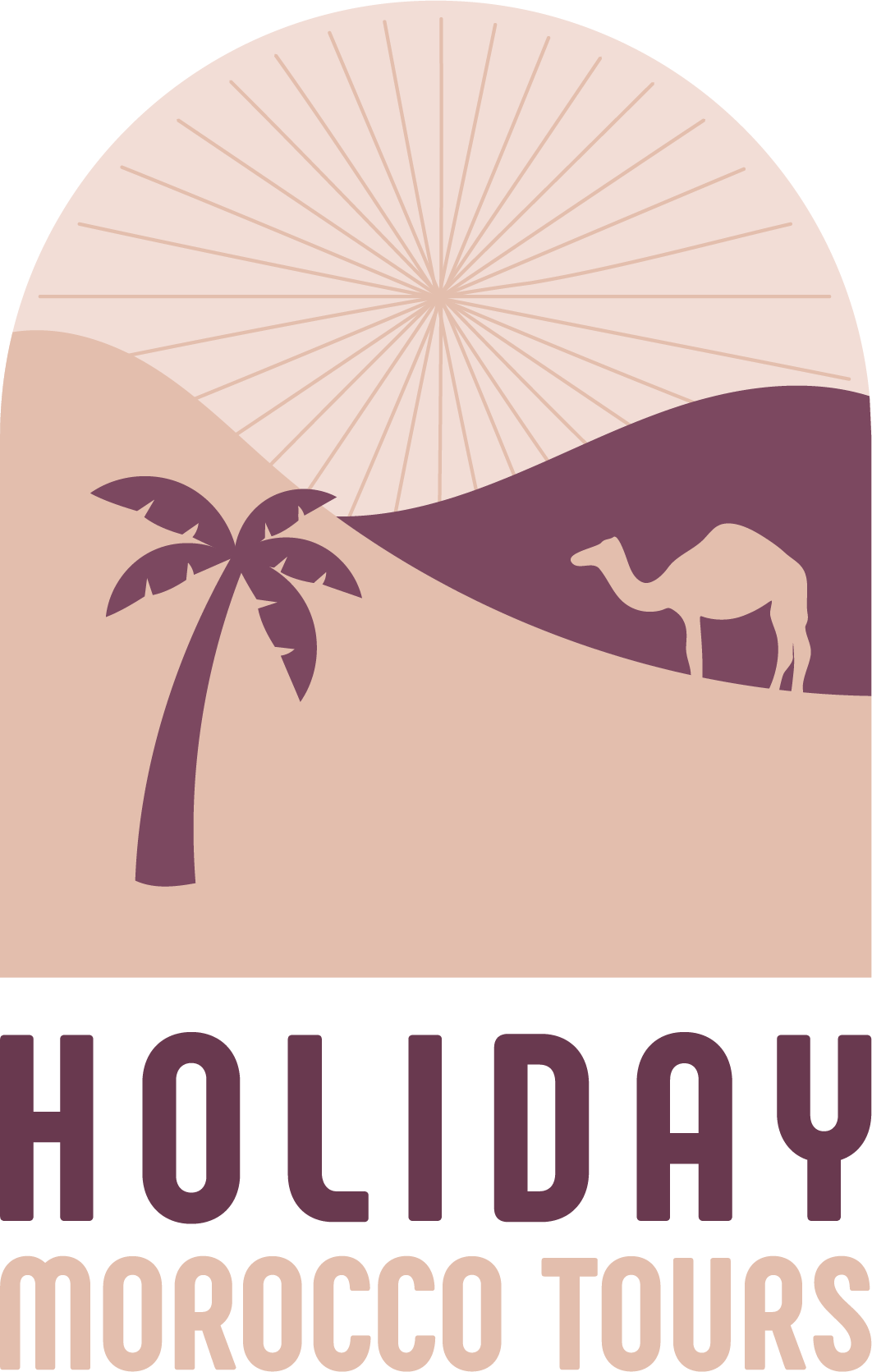Traveling through Morocco is more than just sightseeing—it’s about immersing yourself in a way of life filled with colors, flavors, and genuine human connection. From bargaining in lively souks to sharing mint tea in a riad courtyard, every moment becomes richer when you understand Essential Darija Phrases & Cultural Etiquette. Using a few local expressions not only makes daily interactions smoother, but also shows respect for Moroccan traditions.
Mastering Essential Darija Phrases & Cultural Etiquette opens the door to authentic encounters. You’ll notice how quickly locals respond with warmth when you greet them in their own dialect or follow simple cultural customs. This combination of language and etiquette ensures your experience goes beyond being a tourist—it allows you to be part of the story.
Have you ever felt the difference when locals welcomed you more openly because you tried speaking their language?
Why You Should Learn Moroccan Arabic (Darija) and Essential Darija Phrases & Etiquette for Your Trip
Darija is the everyday language of Morocco, spoken by roughly 80% of Moroccans. Unlike Modern Standard Arabic, which is mainly used in media, schools, or official documents, Darija is the lingua franca in markets, cafes, taxis, and homes, making it an essential tool for any traveler seeking authentic experiences. Learning Darija Phrases & Etiquette is more than just memorizing words—it shows respect for Moroccan culture, builds trust with locals, and enhances your interactions throughout your journey.
Even small efforts go a long way. Greeting someone with “Salam Alaikum” (sah-lahm ah-lay-koom) demonstrates politeness and cultural awareness, while saying “Shukran” (shoo-krahn) to express gratitude or “Bslama” (b-slah-mah) when parting reflects proper Moroccan etiquette. Travelers who embrace Darija Phrases & Etiquette often find themselves invited into local homes, joining tea ceremonies, or sharing stories with shopkeepers—experiences that turn a regular trip into a memorable cultural adventure.
Using Moroccan Arabic during daily interactions, even just for ordering food, asking for directions, or shopping in the souks, instantly creates goodwill. Following Morocco travel tips that emphasize respect for local customs alongside basic Darija Phrases & Etiquette ensures your journey is smoother, more meaningful, and deeply connected to Moroccan life. One traveler shared that after greeting a local shopkeeper in Darija, she was invited to join a small tea ceremony in the back of the shop—a spontaneous moment of kindness she would never forget!
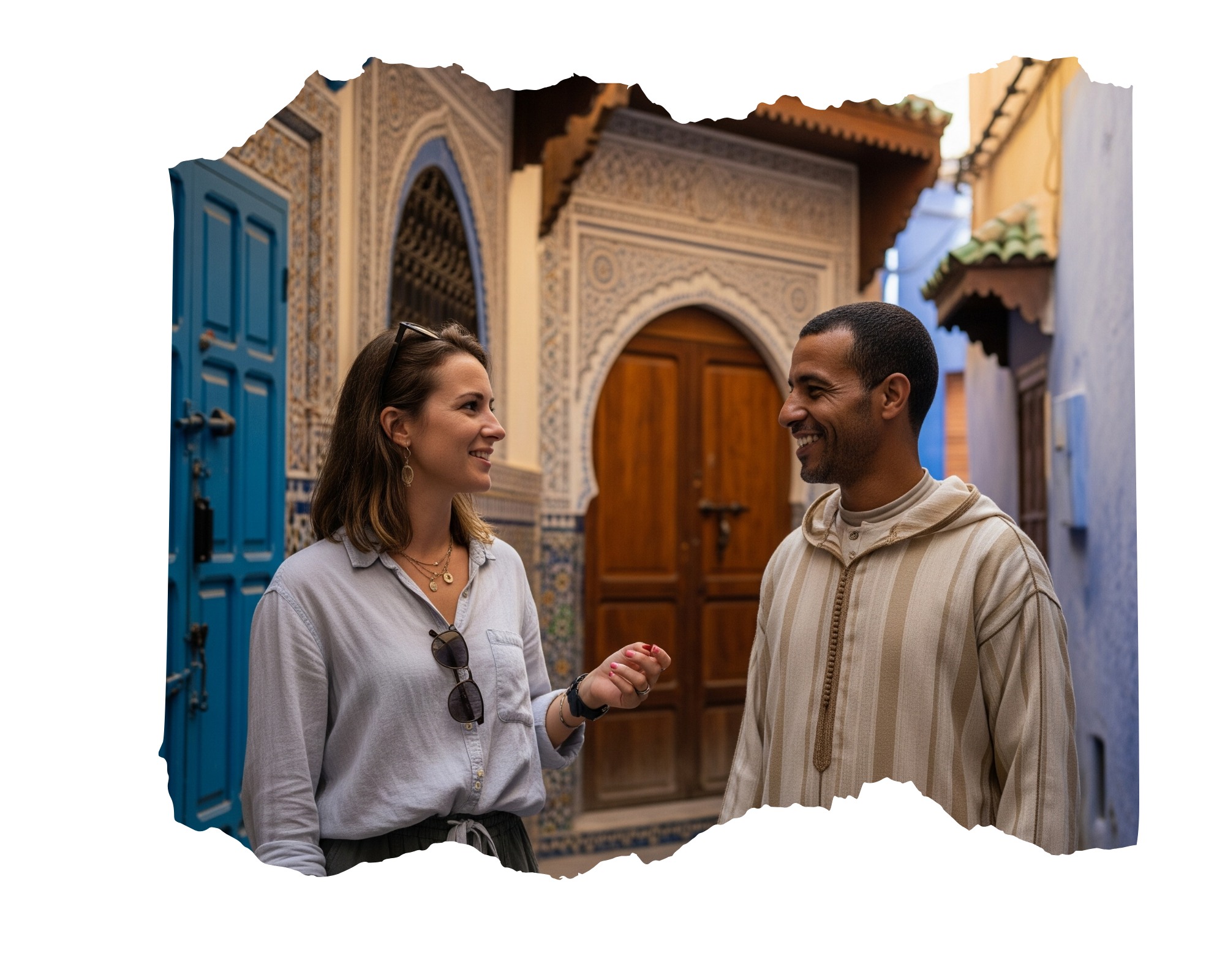
When you walk through Morocco’s bustling souks, colorful medinas, and cozy riads, communication becomes the key to meaningful encounters. This is where Essential Darija Phrases & Cultural Etiquette make all the difference. By learning and practicing Essential Darija Phrases & Cultural Etiquette, you show locals that you are more than just a tourist—you are a respectful traveler who values their culture. A simple “Shukran” or “Bslama” combined with polite gestures can transform a quick exchange into a warm interaction. The more you use Essential Darija Phrases & Cultural Etiquette, the more natural your conversations feel, whether you’re buying spices in Marrakech, asking directions in Fes, or enjoying tea in the Sahara. These small but powerful tools break barriers and invite authentic Moroccan hospitality into your journey.
Essential Darija Phrases for Travelers
Here’s a handy list of common Darija phrases for everyday situations. Knowing these will make your trip easier and more enjoyable.
Greetings & Polite Words
| Darija Phrase | Pronunciation | English Meaning |
| Salam Alaikum | sah-lahm ah-lay-koom | Hello / Peace be with you |
| Labas? | lah-bahs | How are you? |
| Shukran | shoo-krahn | Thank you |
| Bslama | b-slah-mah | Goodbye |
| Afak (ʿafak) | ah-fahk | Please |
| Inshallah | in-shah-lah | God willing / Hopefully |
Other Useful Expressions
- Ma kayn mushkil – No problem / It’s okay
- La, shukran – No, thank you
- B’sh-hall? – How much? (useful in souks and markets)
Which phrase do you think would be most useful during your Moroccan adventure?
Unlock the Real Morocco: Speak Darija & Travel Like a Local!
Ready to experience Morocco beyond the tourist spots? Master Darija Phrases & Etiquette and discover hidden gems, authentic experiences, and local treasures with our expertly organized tours. Book your journey now and connect with Morocco like never before!
Moroccan Cultural Etiquette & Tips
Speaking Darija is only one part of truly respecting Moroccan culture. To make your travels smoother and more meaningful, understanding Darija Phrases & Etiquette alongside Moroccan customs is essential. Knowing how to greet someone properly can open doors to authentic experiences. Shake hands or place your hand over your heart when meeting locals. Same-sex friends may exchange two kisses on the cheek. Men and women should only shake hands if initiated by the woman. One solo female traveler shared that after greeting her riad host politely in Darija, she was welcomed warmly and even received insider tips on hidden attractions—showing how powerful Darija Phrases & Etiquette can be.
Dressing Modestly
Respecting local dress codes is another fundamental aspect of traveling responsibly in Morocco. Women should cover shoulders, arms, and knees, while men should avoid sleeveless shirts or extremely short shorts. Although urban centers like Marrakech, Casablanca, and Rabat are generally more relaxed, dressing modestly demonstrates an understanding of Moroccan etiquette and respect for local culture. Travelers who combine thoughtful attire with Darija Phrases & Etiquette often notice more welcoming interactions, from shopkeepers in the medina to families hosting tea ceremonies in their riads. Dressing appropriately shows that you value Moroccan traditions, and it can help you gain insider tips, explore hidden gems, and enjoy authentic encounters that go far beyond typical tourist experiences.
Dining Etiquette
Sharing meals is a cornerstone of Moroccan culture, and understanding dining etiquette is key to respectful travel. Meals are often served on a communal plate, and it’s customary to wash your hands before eating and to use your right hand for taking food. Saying “Bismillah” (“In the name of God”) before and after meals is a polite gesture that reflects proper Darija Phrases & Etiquette and awareness of Moroccan traditions. Travelers who observe these customs and combine them with local greetings, polite expressions, and cultural sensitivity often find themselves invited into homes, sharing mint tea, traditional pastries, or joining families for celebratory meals. Following Morocco travel tips about dining etiquette not only prevents misunderstandings but also unlocks deeply authentic and memorable cultural experiences, allowing you to connect with locals in ways that go far beyond standard tourism.
Right-Hand Etiquette
In Morocco, using your right hand for eating, giving, or receiving items is not just a minor detail—it is a crucial aspect of Moroccan culture and a central practice within proper Darija Phrases & Etiquette. The left hand is traditionally considered unclean, and ignoring this custom can unintentionally offend your hosts. Travelers who follow this simple rule often find that locals respond with warmth and respect, creating more meaningful interactions. Incorporating Darija Phrases & Etiquette alongside these small gestures—like greeting with “Salam Alaikum” or offering thanks with “Shukran”—helps you blend seamlessly into daily life in Moroccan cities, villages, and even remote desert communities. Observing right-hand etiquette is not just a matter of manners; it reflects your awareness of Moroccan customs and shows that you value local traditions, which can open doors to authentic cultural experiences.
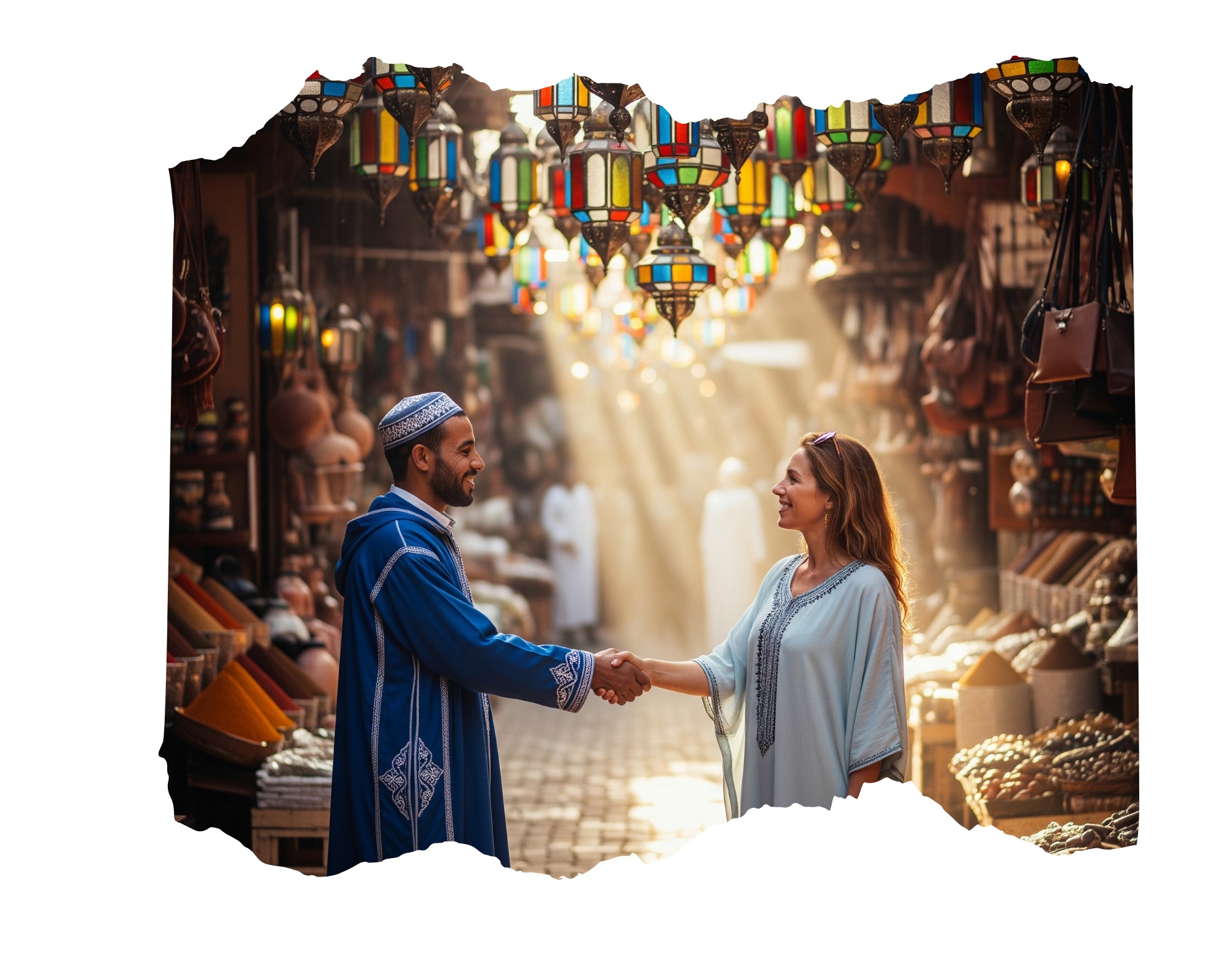
Visiting Homes
- Remove your shoes at the door.
- Bring a small gift like tea, pastries, or fruit.
- Wait for the host to gesture before starting to eat.
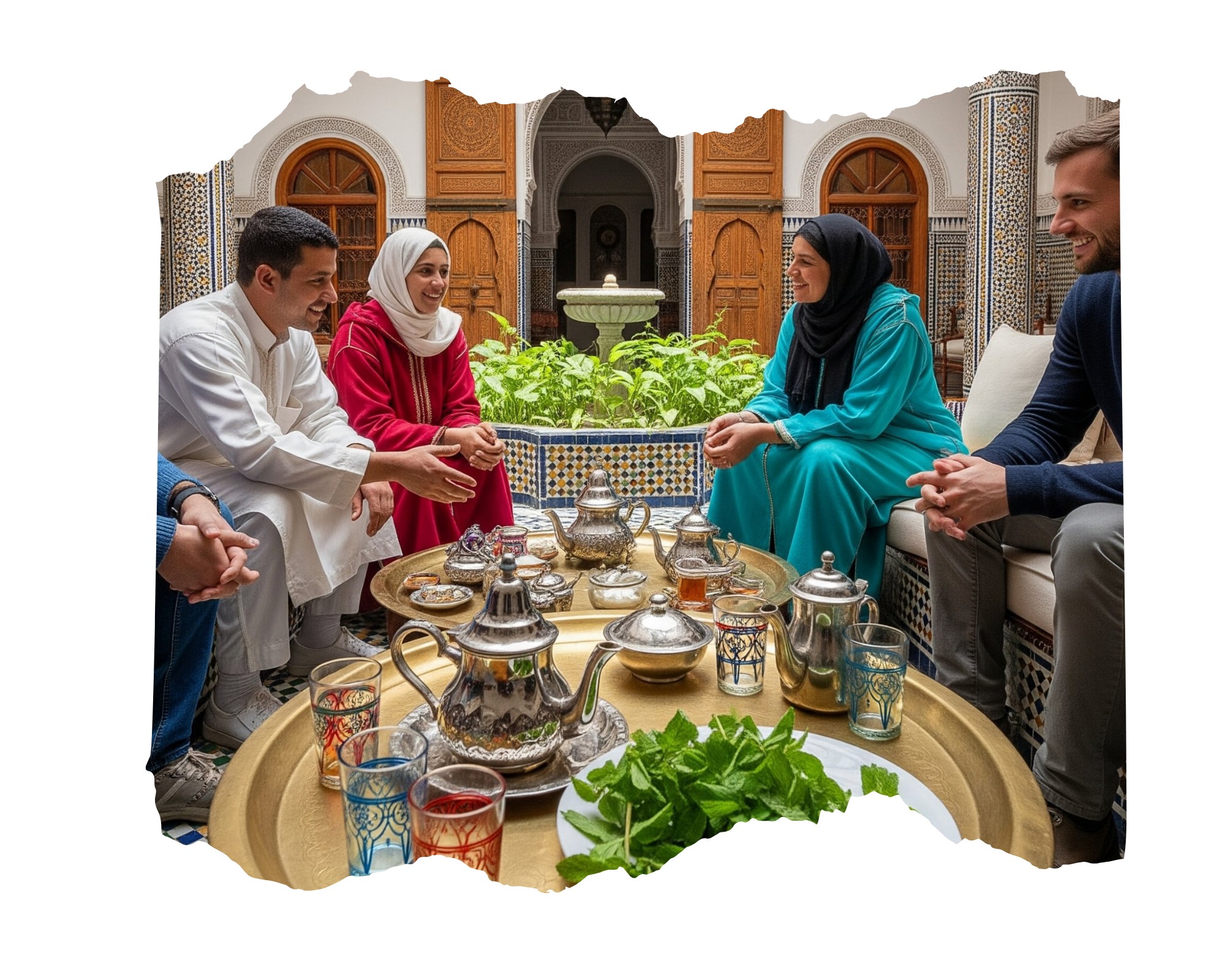
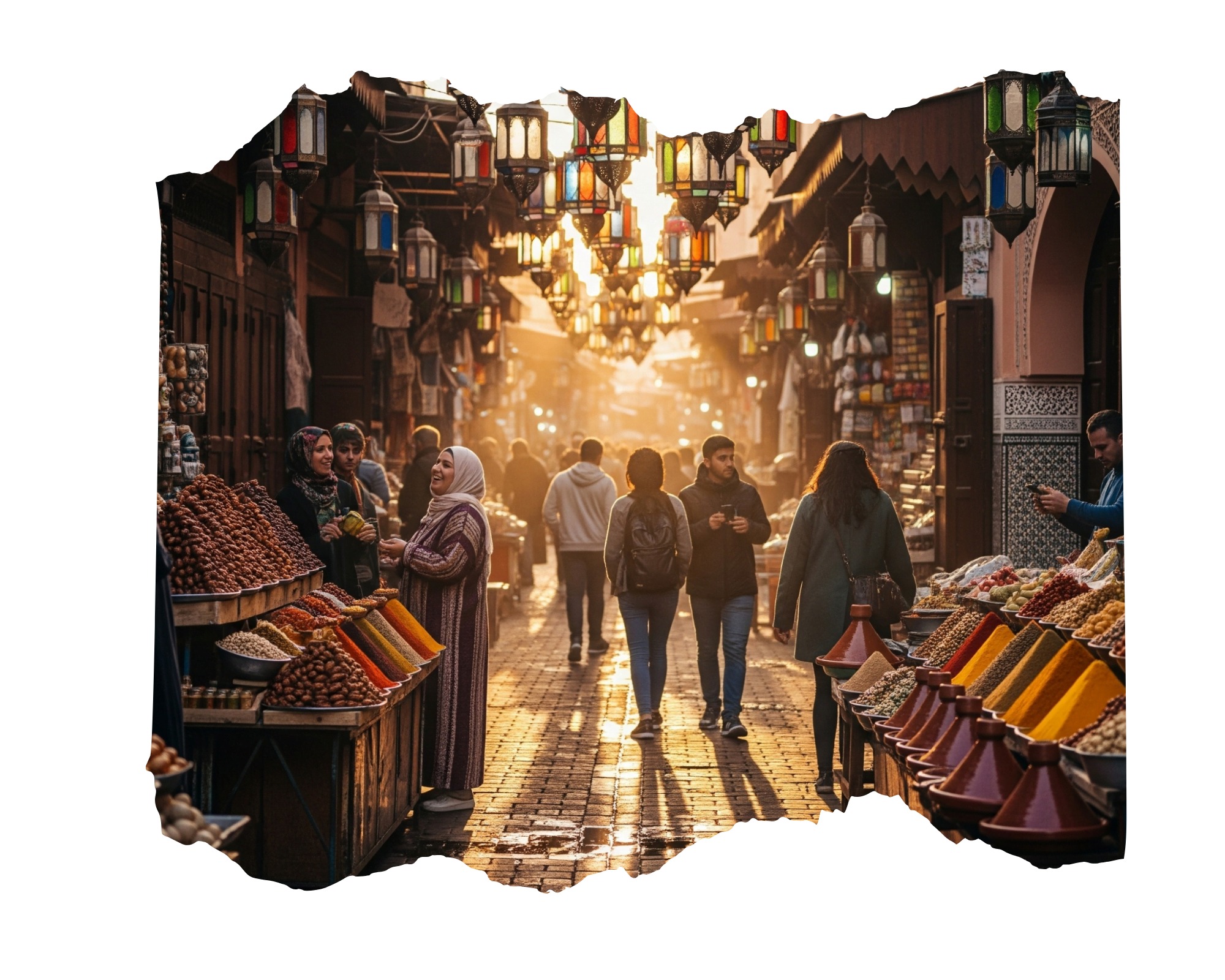
Respect Religion & Ramadan
- Be mindful during Ramadan: avoid eating or drinking in public during daylight hours.
- Non-Muslims may not enter most mosques (except famous ones open to visitors).
Have you ever traveled during Ramadan in another country? How did you adapt?
Top Darija Phrases for Different Situations
-
Souks & Markets: “B’sh-hall?” (How much?), “Afak” (Please)
-
Cafes & Restaurants: “Shukran” (Thank you), “Ma kayn mushkil” (No problem)
-
Taxis & Transportation:“ghadi l-Medina?” (To the Medina?), “Yallah” (Let’s go)
-
Riads & Hotels:“Fayn l-bit dyali?” (Where is my room?), “Bslama” (Goodbye)
Try using these phrases on your next trip and tell us in the comments how locals reacted!
At the end of the day, travel is about more than landscapes or monuments—it’s about connections. And in Morocco, those connections grow stronger when you embrace Essential Darija Phrases & Cultural Etiquette.
Using Essential Darija Phrases & Cultural Etiquette in daily interactions shows locals that you respect their traditions, and in return, they often welcome you with generosity.
From greeting a shopkeeper in Darija to observing dining customs in a family home, every detail matters. The more you apply Essential Darija Phrases & Cultural Etiquette, the richer your Moroccan adventure becomes.
So pack these words and customs alongside your guidebook, and don’t forget to share your own experiences—how did Essential Darija Phrases & Cultural Etiquette shape your journey? Your story could inspire the next traveler to connect with Morocco in a deeper, more authentic way.
Have you traveled to Morocco before? Which Darija phrase helped you the most? Share your experiences and tips in the comments below – your story might help fellow travelers make the most of their Moroccan adventure!
Even a small effort to speak Darija or follow local etiquette can turn a regular trip into an unforgettable experience.
